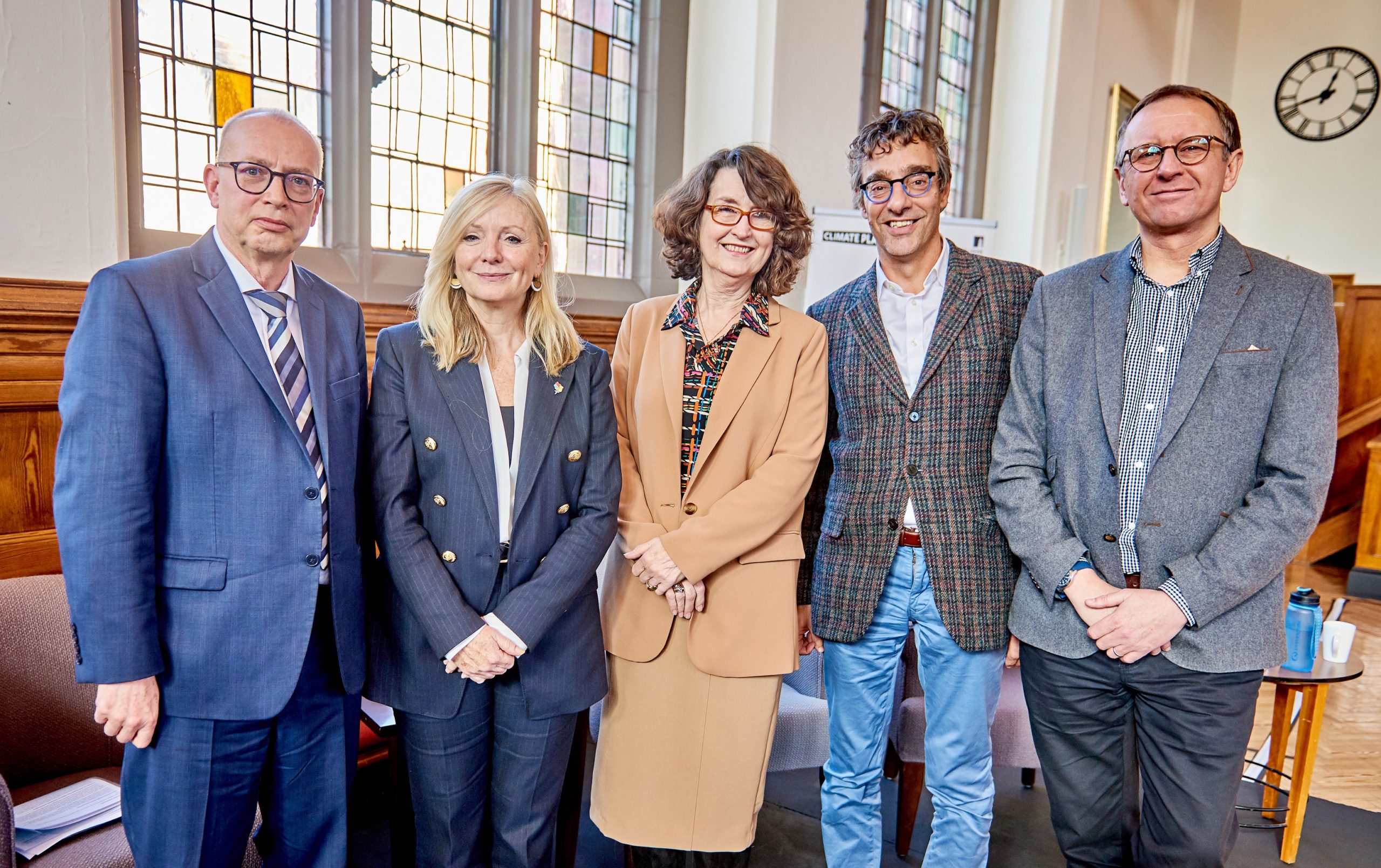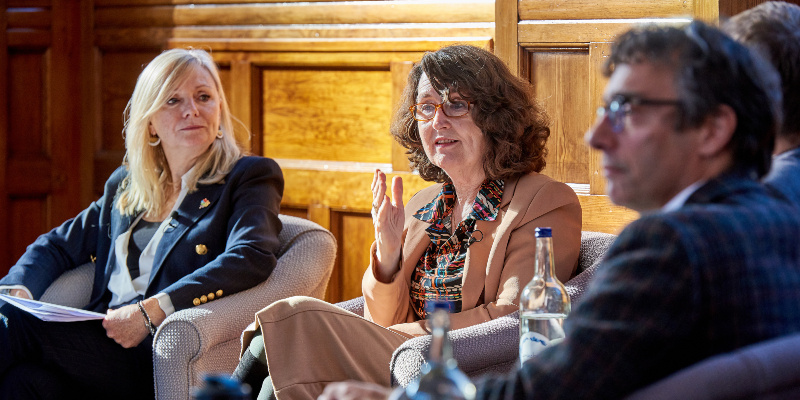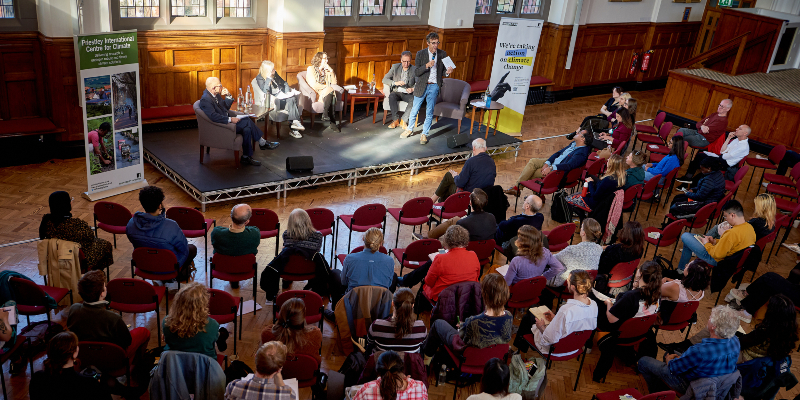Getting Yorkshire to net zero

Regional leaders and organisations must work ever more closely to achieve net zero in Yorkshire and the Humber.
That is the shared view of University of Leeds Vice-Chancellor Professor Simone Buitendijk, West Yorkshire Mayor Tracy Brabin, and key Leeds climate researchers and practitioners, Professors Piers Forster and Andy Gouldson.
During a panel discussion in the University’s Great Hall this week and ahead of COP27, the speakers explored both the challenges faced by, and the progress made within, the region towards tackling its carbon footprint and how those in power can share their resources to help the region achieve net zero emissions. Topics included the economic and pollutive burden of fuel consumption; plans for a mass-transit system; and what can be done on an individual level such as cycling, taking public transport and eating less meat.
If there’s ever a topic where it’s so clear that we need to work with young people, it is climate change.
Professor Buitendijk said: “I am very pleased that the University of Leeds is able to play its part in this global, national and regional issue – which we can only solve if we are working together.
“The University strategy – Universal Values, Global Change – and the UN Sustainable Development Goals are at the heart of everything we are trying to achieve. I think universities are supremely well-placed to make a positive impact on all global challenges. But we can’t do it alone.
“We do amazing, cutting-edge research that can get at the heart of sustainable solutions. But for me, most importantly, we are the place where the next generation of leaders is being trained, and if there’s ever a topic where it’s so clear that we need to work with young people, it is climate change.”
 Vice-Chancellor Professor Simone Buitendijk addresses the audience. Picture: Victor de Jesus
Vice-Chancellor Professor Simone Buitendijk addresses the audience. Picture: Victor de JesusDevolution of power
West Yorkshire Mayor Tracy Brabin talked about the region’s unique opportunity provided by devolution of political power. She said: “We can forge our own path and try to make the case that we can help government meet their targets if they work with us.
“As a combined authority we made the commitment to zero carbon by 2038 at the latest and our Climate and Environment Plan sets out those actions we are going to take to hit that target. As it stands we are only four-fifths of the way there and that is why collaboration is really important – with you (students and the public) and with the people on this panel because we can’t do this on our own. We need academia and we need research institutions, which are so vital to the success of our plan.
“We have huge ambitions and a wealth of world-leading expertise here in this university and more widely.”
Andy Gouldson, Professor of Environmental Policy in Leeds’ School of Earth and Environment and Co-Director of the Yorkshire and Humber Climate Commission, highlighted how Yorkshire’s carbon footprint is bigger than eight EU member states and said that the region’s energy bill is £30bn a year.
He said: “That’s £30bn that could be staying in our region, creating wellbeing, creating equity, addressing poverty, creating jobs and prosperity. It is leaking out of our region, paying for an energy bill we are going to struggle to pay: 70% of households in Yorkshire and Humber are forecast to be in fuel poverty in January this coming year.”
 Professor Piers Forster addresses the audience. Picture: Victor de Jesus
Professor Piers Forster addresses the audience. Picture: Victor de JesusCommunication and co-ordination
Piers Forster, Professor of Climate Physics in the School of Earth and Environment and Founding Director of the Priestley International Centre for Climate, said that local authorities are ambitious and passionate about achieving net zero but were not getting support from central government.
He said: “We need something in between central government and local authorities to really try and deliver that joined up co-ordination.”
And he stressed that every government policy should have a net zero test, ensuring that government spending decisions are informed by their impact on meeting net zero emissions.
The panel agreed that of key importance was university communication of climate solutions and engagement with youth and the general public as a whole.
We have huge ambitions and a wealth of world-leading expertise here in this university
Chaired by Professor Richard Beardsworth, Head of the School of Politics and International Studies, and with more than 150 attendees both in person and online, the event heard from impassioned students and members of the public who asked the panel challenging questions about University and political policy.
Matters raised included the proposed expansion of Leeds Bradford Airport and how the climate crisis can be factored in across the University curriculum.
Professor Beardsworth said: “The University of Leeds is a centre of international excellence in climate research, and as such is a key contributor to the collaborative work taking place to get Yorkshire and Humber to net zero. The partnership among the multidisciplinary University community, West Yorkshire Mayor Tracy Brabin, and other policymakers, businesses and industries across the region, has the expertise, the drive and the passion to achieve our collective goal.
“This was a successful first event which must be followed up by closer coordination mechanisms to elicit maximum enquiry and impact at regional scale. It is also important that we engage with the public, youth and university students on key areas of climate frustration.”
Further information
For media enquiries, contact University of Leeds press officer Lauren Ballinger via l.ballinger@leeds.ac.uk.
Main picture: Professor Richard Beardsworth, West Yorkshire Mayor Tracy Brabin, Vice-Chancellor Professor Simone Buitendijk, Professor Piers Forster and Professor Andy Gouldson standing together on stage in the Great Hall at Leeds. Credit: Victor de Jesus
